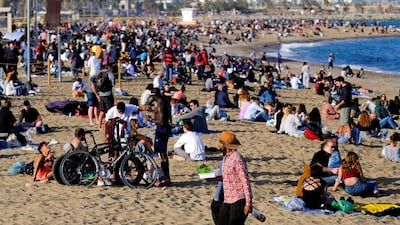Spain says it will allow vaccinated travellers from non-EU countries to enter the country from next month.
Prime Minister Pedro Sanchez said on Friday the new rule would apply to all travellers from June 7, regardless of their origin.
However, the lucrative UK and US markets would have been at the front of his mind. Britain is Spain's largest market for tourists, while American travellers make up the largest share of its long-haul visitors.
The decision comes after the EU's 27 countries agreed on Wednesday to open up to fully vaccinated visitors and ease rules that bar non-essential travel from countries where coronavirus infection rates pass a cut-off point.
Under the plan, the maximum permitted 14-day infection rate per 100,000 people would be raised from 25 to 75.
But visitors from countries not on the list will still be able to travel to Europe if they have been fully immunised with an EU-approved product.
The vaccines approved by the bloc’s regulators are those by Pfizer-BioNTech, Moderna, AstraZeneca and Johnson & Johnson.
The European Medicines Agency has yet to give a verdict on Russia's Sputnik V and China's Sinopharm vaccines.
However, the EU agreement needs formal ministerial approval and is only a recommendation.
It is an attempt to introduce a blanket system across the bloc, with fragmented opening already taking place as a growing number of countries divert from the continent’s common travel rules.
The proposed EU new rules will also be dependent on the successful launch of a planned health pass – known as a "digital green certificate" – which is proving complicated to implement.
It was supposed to be operational from June and ease movement across the bloc for those who could show they had been vaccinated, had a negative test, or been through an infection.
But negotiations to finalise the scheme between the European Parliament, member states and the bloc's executive have been making slow progress.
The delay is causing major concerns for some countries, as they are desperate to free up travel before the vital summer season in a bid to revive battered tourism sectors.
Spain is the latest such country to bring in its own rules independently of the bloc.
Speaking at the Fitur international tourism trade fair in Madrid, Mr Sanchez said the return of tourism would be the key driver of Spain's economic recovery.
Spain will also allow tourists from non-EU countries deemed a low coronavirus infection risk to enter with a negative PCR test.
Britain, Australia, New Zealand and Israel are among the countries on that list.
"They're welcome – more than welcome – without restrictions or health controls," he said.
He said the new travel regime meant international tourist arrivals would reach an estimated 70 per cent of pre-pandemic levels by the end of the year.
This summer, he forecast arrivals could reach 30 to 40 per cent of 2019 levels.
The European Travel Commission welcomed the EU's revised rules for travel and stressed the importance of long-haul markets.
"This is great news for the industry. Both the US and China are the biggest source markets coming from out of the EU, also in terms of expenditure, in terms of loyalty to destinations," director Eduardo Santander said.


